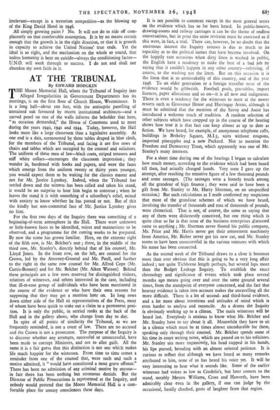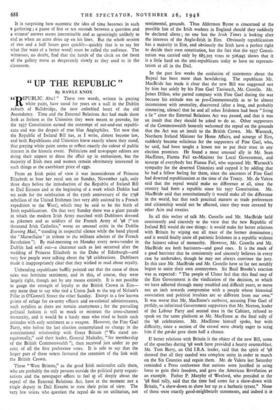AT THE TRIBUNAL
By EDWARD HODGKIN
THE Moore Memorial Hall, where the Tribunal of Inquiry into Alleged Irregularities in Government Departments has its meetings, is on the first floor of Church House, Westminster. It is a long hall—about too feet, with the antiseptic panelling of unstained oak favoured by recent institutional architects—and a carved panel on one of the walls informs the beholder that here, "as occasion demanded," the House of Commons used to meet during the years 1940, 5941 and 1944. Today, however, the Hall looks more like a large classroom than a legislative assembly. At one end is a dais, surmounted by three tables draped in blue cloth, for the members of the Tribunal, and facing it are five rows of chairs and tables which are occupied by the counsel and solicitors. The uniform of these men of law—black coats, striped trousers and stiff white collars—encourages the classroom impression; they wander in, burdened with books and papers, and were the faces which emerge from the uniform twenty or thirty years younger, you would expect them to be waiting for the classics master and not for Mr. Justice Lynskey. Indeed, when the Tribunal has settled down and the witness has been called and taken his stand, it would be no surprise to hear him begin to construe ; when he leaves the stand it is with something of a schoolboy's relief, mixed with anxiety to know whether he has passed or not. But of this the kindly but non-committal face of Mr. Justice Lynskey gives no hint.
For the first two days of the Inquiry there was something of a beginning-of-term atmosphere in the Hall. There were unknown or little-known faces to be identified, voices and mannerisms to be observed, and a programme for the coming weeks to be prepared. By now the scene has grown familiar. Here, on the extreme right of the fifth row, is Mr. Belcher's seat ; there, in the middle of the third row, Mr. Stanley's, directly behind that of his counsel, Mr. Lloyd Jones. In the front row, on the left, are counsel for the Crown, led by the Attorney-General and Mr. Paull, and further to the right in the same row counsel for Mr. Alfred Cope (Mr. Curtis-Bennett) and for Mr. Belcher (Mr. Aiken Watson). Behind these principals are a few rows reserved for distinguished visitors, relatives of witnesses, and others interested in the case, including that ill-at-ease group of individuals who have been mentioned in the course of the evidence or who have their own reasons for supposing that they may get a mention later on. In long rows down either side of the Hall sit representatives of the Press, most of whom have been quick to stake out a claim to a permanent posi- tion. It is only the public, in serried ranks at the back of the Hall and in the gallery above, who change from day to day.
In spite of all points of similarity the Tribunal, as we are frequently reminded, is not a court of law. There are no accused and the Crown is not a prosecutor. The purpose of the Inquiry is to discover whether any attempts, successful or unsuccessful, have been made to corrupt Ministers, and not to allot guilt. All the same it is a fair guess that this distinction is not one which makes life much happier for the witnesses. From time to time comes a reminder from one of the counsel that, were such and such a motive admitted, it "would have constituted a most grave offence." There has been no admission of any criminal motive by anyone— in fact there has been nothing but strenuous denials. But the Director of Public Prosecutions is represented at the Inquiry, and nobody would pretend that the Moore Memorial Hall is a com- fortable place for uneasy consciences these days.
It is not possible to comment except in the most general terms on the evidence which has so far been heard. In public-houses, drawing-rooms and railway carriages it can be the theme of endless conversations, but in print the same restraint must be exercised as if this were, in fact, a trial. There can, however, be no doubt that the enormous interest the Inquiry arouses is due as much to its topicality as to the political names that have become involved. On the happily rare occasions when dirty linen is washed in public, the English have a tendency to make the best of a bad job by saying that it couldn't happen in any other country—referring, of course, to the washing not the linen. But on this occasion it is the linen that is so unmistakably of this country, and of the year 5948. To an older generation or a foreign traveller most of the evidence would be gibberish. Football pools, pin-tables, import licences, paper allocations and so on—it is all new and indigenous. There is even a tendency for the witnesses to meet at the newer resorts such as Grosvenor House and Harringay Arena, although it must be admitted that the mention of the Savoy and Ascot has introduced a welcome touch of tradition. A random selection of other subjects which have cropped up in the course of the hearing shows how true it is that fact can keep almost as up to date as fiction. We have heard, for example, of anonymous telephone calls, buildings in Berkeley Square, M.I.5, suits without coupons, imported pineapples and a new Packard. Not to mention the Freedom and Democracy Trust, which apparently was one of Mr. Stanley's many interests.
For a short time during one of the hearings I began to calculate how much money, according to the evidence which had been heard till then, had actually changed hands. Very soon I gave up the attempt, after reaching the tentative figure of a few thousand pounds and some sausages. (The sausages were a homely touch among all the grandeur of high finance ; they were said to have been a gift from Mr. Stanley to Mr. Harry Sherman, on an unspecified occasion.) But such calculations as I made confirmed my suspicions that most of the grandiose schemes of which we have heard, involving the transfer of thousands and tens of thousands of pounds, were chimerical That is not, of course, the same as saying that any of them were dishonestly conceived, but one thing which is quite clear so far is that none of the business enterprises discussed came to anything ; Mr. Sherman never floated his public company, Mr. Price and Mr. Harris never got their amusement machinery from America, Mr. Bieber never got his new car, and Mr. Stanley seems to have been unsuccessful in the various ventures with which his name has been connected.
As the second week of the Tribunal draws to a close it becomes more than ever obvious that this is going to be a very long affair indeed ; not quite Tichbome length perhaps, but several laps more than the Budget Leakage Inquiry. To establish the exact chronology and significance of events which took place several months ago means going over and over the same ground several times, from the standpoint of everyone concerned, and the fact that hearsay evidence is taken into account makes the unravelling all the more difficult. There is a lot of second- and third-hand evidence, and a lot more about intentions and attitudes of mind which is even harder to analyse and reconcile. As a drama the Inquiry is obviously working up to a climax. The main witnesses will be heard last. Everybody is anxious to know what Mr. Belcher and Mr. Stanley have to say about it all. Meanwhile they have to sit in a silence which must be at times almost unendurable for them, speaking only through their counsel. Mr. Belcher spends some of his time in court writing notes, which are passed on to his solicitors. Mr. Stanley sits more impassively, his head cupped in his hands, his lips pursed, brooding with an almost oriental patience. It is curious to reflect that although we have heard so many remarks attributed to him, none of us has heard his voice yet. It will be very interesting to hear what it sounds like. Some of the earlier witnesses had voices as low as Cordelia's, but later corners to the stand, notably Messrs. Williams, Cross and Haworth, have been admirably clear even in the gallery, if one can judge by the occasional, hastily checked, gusts of laughter from that region.
It is surprising how eccentric the idea of time becomes in such a gathering ; a pause of five or ten seconds between a question and a witness' answer seems interminable and as agonisingly unlikely to end as when an actor dries up on his lines. But the whole session of two and a half hours goes quickly—quickly that is to say for what (for want of a better word) must be called the audience. The witnesses, no doubt, find that the hands of the clock on the front of the gallery move as desperately slowly as they used to in the classroom.





































 Previous page
Previous page